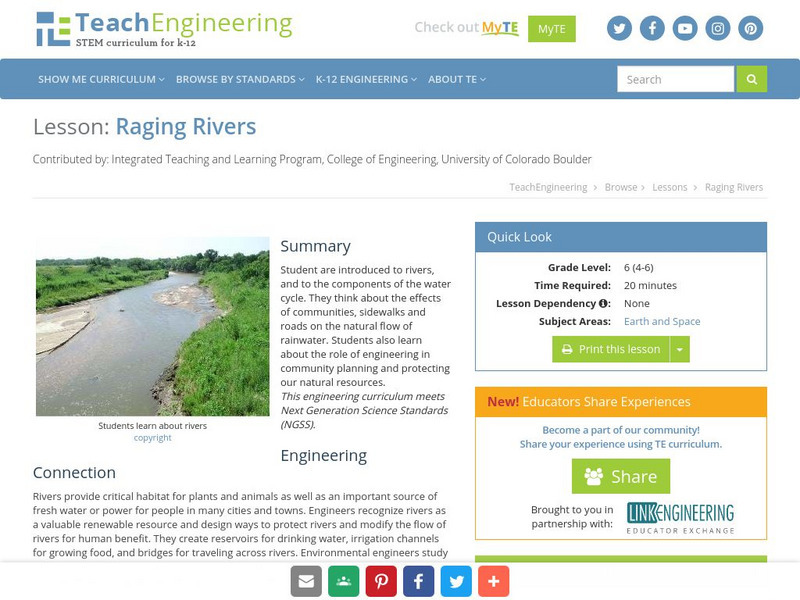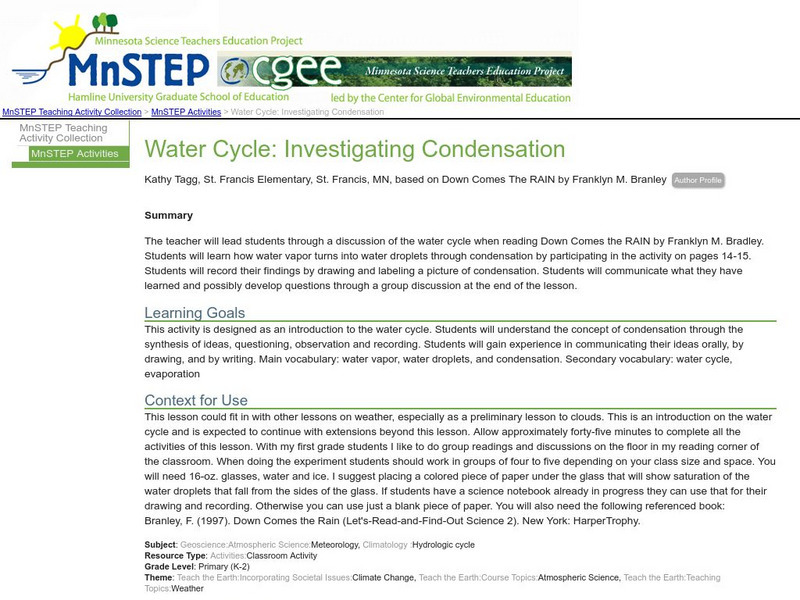Hi, what do you want to do?
Curated OER
Flower Power
Students investigate and explain the basic needs and life processes of plants. Key concepts include: living things change as they grow and need food, water, and air to survive. The reverse of the Kansas quarter serves as inspiration.
Curated OER
Obesity
Students examine how hormones affect different tissues. In groups, they make their own hormone-receptor model and identify the characteristics of tissues that respond to the different hormones. To end the lesson, they examine the role...
Curated OER
Sacred Places
Students examine places considered sacred in both India and the U.S. They read and discuss a website on the Ganges River, discuss places considered sacred in the U.S., and write an essay comparing/contrasting personal sacred places and...
Curated OER
Geology/Earth Structure
Third graders examine the rock-soil cycle. They identify the steps and describe what happens. They also discover the three layers of soil.
Curated OER
Something's Fishy
Students study fish habits and traits. In this marine life lesson, students complete four learning centers of a fish memory game, a fish habitat study, draw and glue fish craft activity, and a fish read-a-thon. Students complete their...
Curated OER
Plant Growth
Young scholars role play as text book creators by designing an animation showing plant growth from seed to maturity. They incorporate things that plants need to grow in the animation.
Curated OER
Different Genres In Literature
Third graders view different genres of literature and identify which genre is being presented to them. In this genres lesson plan, 3rd graders choose from fiction, non fiction, and a poem.
Curated OER
Magnetic Discovery Bottle
Students examine how to conduct simple investigations and use simple equipment to gather data. In this magnet instructional activity students decide what types of objects are attracted to magnets.
Curated OER
Design a Reef!
Students design a functional model of a coral reef ecosystem. In this coral reef activity, students identify the energy sources and material cycles of a coral reef. They write an essay about their niche in their own ecosystem.
Curated OER
Gardening for Beauty, Food, and Enjoyment
First graders create their own garden. In this plant lesson, 1st graders discover the essential elements for a plant to grow. They planted their own garden and read the amount of space needed and the sunlight preferred for each plant.
Curated OER
Flower Reproduction
Fifth graders examine the cycle of flower reproduction. They listen to a poem about a bee, observe and examine flowers in small groups, and develop a class KWL chart. Students then read about flower reproduction in their textbook, and...
Curated OER
Think Green
Students experience and practice compositing and recycling through hands-on-activities. They distinguish between which items from their trash can be recycled, composted and reused. The process for making recycled paper is also covered in...
Curated OER
Clouds
Students study how to use the Internet as a static information collection tool, to enhance the literature stories on the weather and study how to use the calculator.
Curated OER
Seeds and Similarities
Students use the scientific inquiry method to identify the changes in a plant's life cycle. In groups, they plant different types of plants and use a chart to compare and contrast their growth rates. They share their conclusions with...
Curated OER
Ziplock Chemistry
Students investigate various chemical reactions when creating mixtures in ziplock baggies. For this chemistry lesson, students will recognize various chemical reactions and cite evidence. Safety and assessment strategies are included in...
Science Education Resource Center at Carleton College
Serc: Mn Step: Terrarium Investigating the Water Cycle in a 1 or 2 Liter Bottle
For this activity, students construct a terrarium in a bottle, and observe it over time to see when it 'rains,' which will indicate the completion of a water cycle.
TeachEngineering
Teach Engineering: Raging Rivers
The lesson plan introduces students to the steps of the water cycle and rivers. They think about the effects of communities, sidewalks and roads on the natural flow of rainwater. Students also learn about the role of engineering in...
Science Education Resource Center at Carleton College
Serc: Mn Step: Water Cycle: Investigating Condensation
Students will listen to a story about the water cycle, observe how water droplets form on a glass of icy water, then draw and label a picture showing condensation.
Other
My Science Box: Crayon Rock Cycle
A great lesson plan that uses crayon shavings, aluminum foil, and hot water to introduce the three main types of rocks and the processes needed to form them. Included are the lesson objectives, vocabulary, and step-by-step procedures to...
Science Education Resource Center at Carleton College
Serc: Mn Step: Watersheds Urban and Rural
For this activity students build models of two types of watersheds, one urban and one rural. They will then simulate rain or the water cycle and observe what happens to the 'soil.' This activity leads to discussions about the water...
























